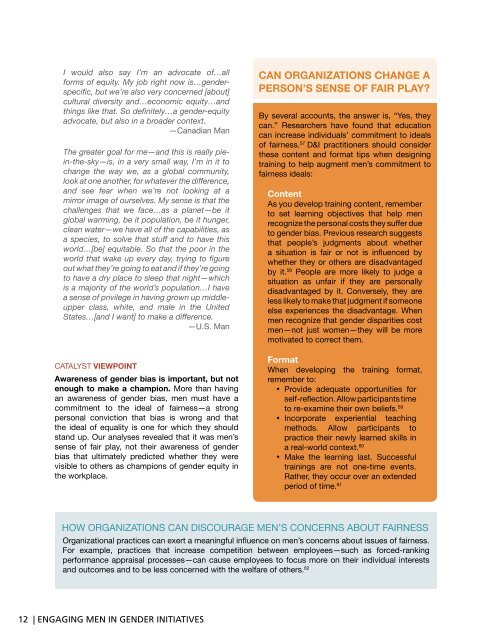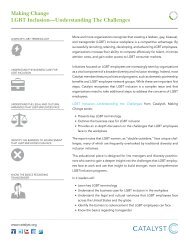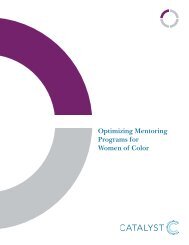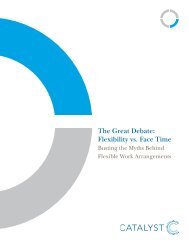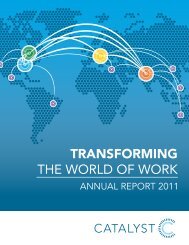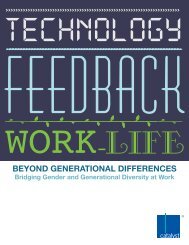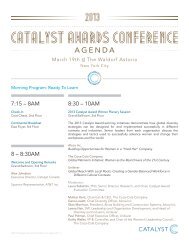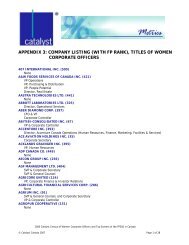ENgAgiNg MEN iN gENdEr iNiTiATivEs - Catalyst
ENgAgiNg MEN iN gENdEr iNiTiATivEs - Catalyst
ENgAgiNg MEN iN gENdEr iNiTiATivEs - Catalyst
- No tags were found...
You also want an ePaper? Increase the reach of your titles
YUMPU automatically turns print PDFs into web optimized ePapers that Google loves.
I would also say I’m an advocate of…allforms of equity. My job right now is…genderspecific,but we’re also very concerned [about]cultural diversity and…economic equity…andthings like that. So definitely…a gender-equityadvocate, but also in a broader context.—Canadian ManThe greater goal for me—and this is really piein-the-sky—is,in a very small way, I’m in it tochange the way we, as a global community,look at one another, for whatever the difference,and see fear when we’re not looking at amirror image of ourselves. My sense is that thechallenges that we face…as a planet—be itglobal warming, be it population, be it hunger,clean water—we have all of the capabilities, asa species, to solve that stuff and to have thisworld…[be] equitable. So that the poor in theworld that wake up every day, trying to figureout what they’re going to eat and if they’re goingto have a dry place to sleep that night—whichis a majority of the world’s population…I havea sense of privilege in having grown up middleupperclass, white, and male in the UnitedStates…[and I want] to make a difference.—U.S. ManCATALYST VIEWPOINTAwareness of gender bias is important, but notenough to make a champion. More than havingan awareness of gender bias, men must have acommitment to the ideal of fairness—a strongpersonal conviction that bias is wrong and thatthe ideal of equality is one for which they shouldstand up. Our analyses revealed that it was men’ssense of fair play, not their awareness of genderbias that ultimately predicted whether they werevisible to others as champions of gender equity inthe workplace.can organizations Change aPerson’s Sense of Fair Play?By several accounts, the answer is, “Yes, theycan.” Researchers have found that educationcan increase individuals’ commitment to idealsof fairness. 57 D&I practitioners should considerthese content and format tips when designingtraining to help augment men’s commitment tofairness ideals:ContentAs you develop training content, rememberto set learning objectives that help menrecognize the personal costs they suffer dueto gender bias. Previous research suggeststhat people’s judgments about whethera situation is fair or not is influenced bywhether they or others are disadvantagedby it. 58 People are more likely to judge asituation as unfair if they are personallydisadvantaged by it. Conversely, they areless likely to make that judgment if someoneelse experiences the disadvantage. Whenmen recognize that gender disparities costmen—not just women—they will be moremotivated to correct them.FormatWhen developing the training format,remember to:• Provide adequate opportunities forself-reflection. Allow participants timeto re-examine their own beliefs. 59• Incorporate experiential teachingmethods. Allow participants topractice their newly learned skills ina real-world context. 60• Make the learning last. Successfultrainings are not one-time events.Rather, they occur over an extendedperiod of time. 61How Organizations Can Discourage Men’s Concerns About FairnessOrganizational practices can exert a meaningful influence on men’s concerns about issues of fairness.For example, practices that increase competition between employees—such as forced-rankingperformance appraisal processes—can cause employees to focus more on their individual interestsand outcomes and to be less concerned with the welfare of others. 6212 | Engaging Men in Gender Initiatives


